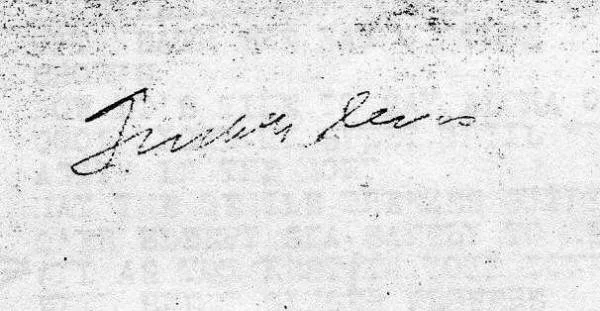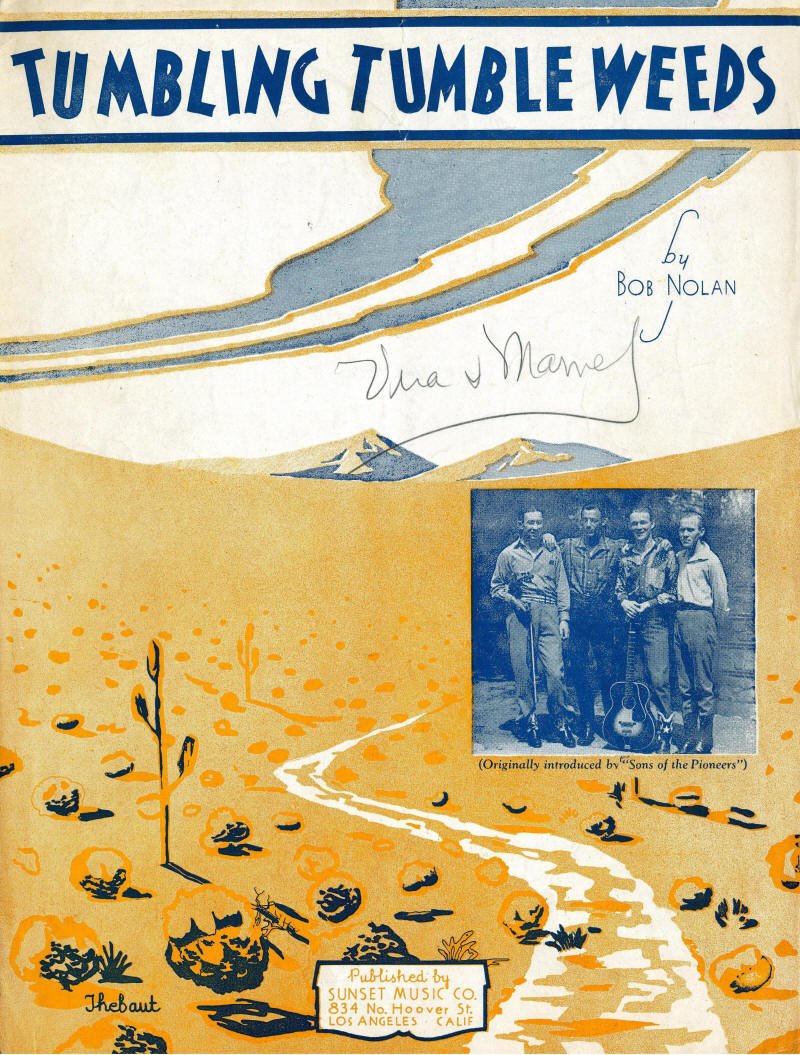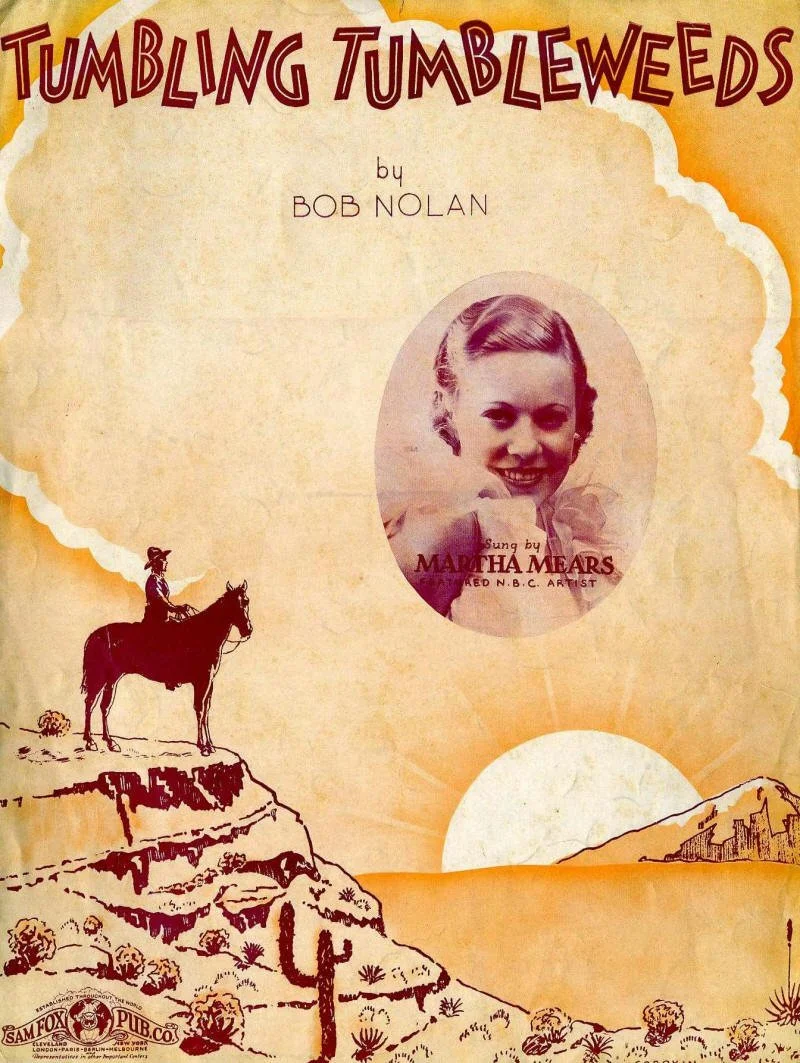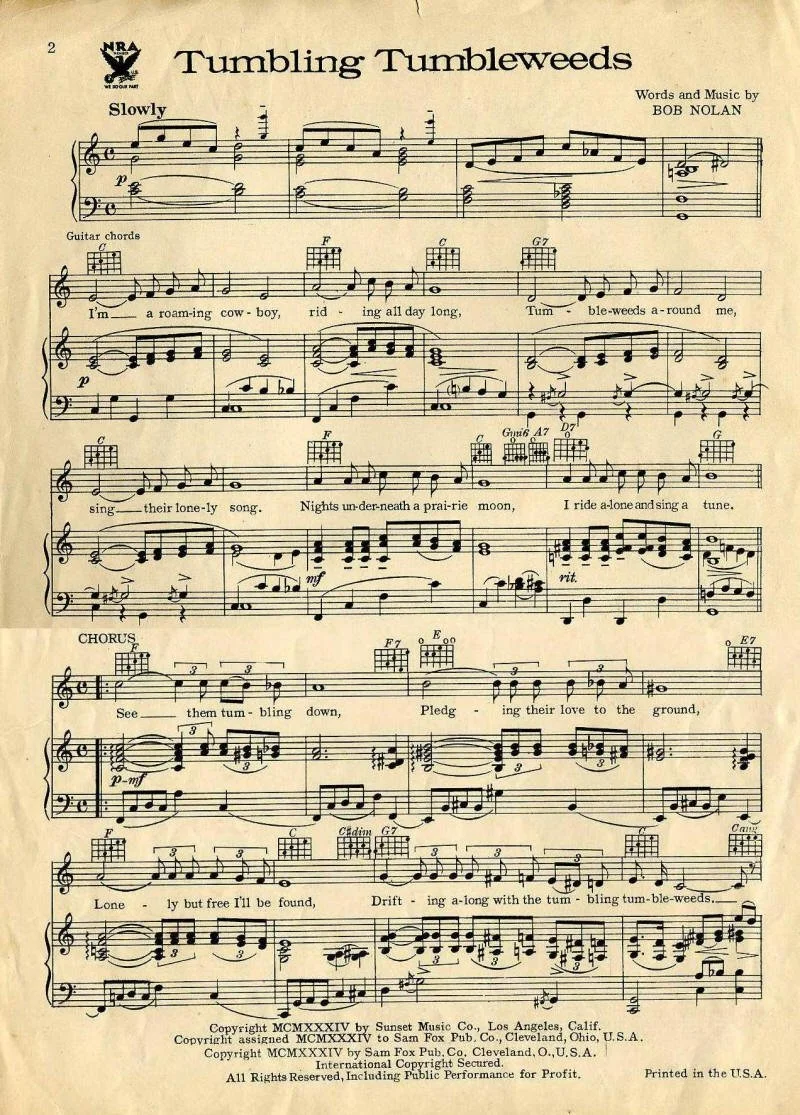Tumbling Tumbleweeds: Evolution of a Western Standard
Larry Hopper, 2008
Originally published in The Western Way Spring 2008 Issue. Reproduced here by permission of the copyright holder. Thank you to Dave Bourne, Elizabeth McDonald, Hal Spencer and Laurence Zwisohn for their contributions to this article.
It didn’t start out to be a western classic but within twenty years Tumbling Tumbleweeds was well down the trail to that goal. Originally conceived as a song of loneliness, equivocation and determination it evolved through misunderstanding and external manipulation into a fundamental evocation of the iconic American cowboy working the range and at one with his environment. Return with us now to those early days when Depression was upon the land, jobs were scarce, becoming scarcer, and few could see any light in the dust storm of financial collapse except a young man with “a song in his heart.”
Bob Nolan arrived in Los Angeles from Tucson at about the same time Wall Street laid its egg. He worked as a lifeguard, caddy, a cook in Los Angeles, performer in a Chautauqua tent show, and on the boardwalk at Santa Monica while rooming on Grand Avenue in Los Angeles. According to Bob’s statements contained in Nolan v. Williamson Music and et al. (1969) he had written Tumbling Tumbleweeds, or its predecessor Tumbling Leaves, as early as 1929. Since it was Bob’s habit to be “writing” several songs at a time in his mind before committing them to paper it is a safe assumption that he was speaking figuratively.
The evolution from mind to hard copy manifests in the “book” of the O-Bar-O Cowboys. [See Tracking the Evolution below] The O-Bar-O Cowboys were made up of Len Slye (Roy Rogers), Tim Spencer, Bill “Slumber” Nicholls, “Cactus Mac” MacPeters and a fellow known only as “Cyclone.” They formed after Bob had left the Rocky Mountaineers, returning to better pay as a caddy at the Bel Air Country Club.
The typed lyric sheets used by the O-Bar-O Cowboys for their ill-advised summer 1933 tour of the southwest contained three indicative pieces of evidence to possible dating of Tumbling Leaves.
The first was an otherwise blank sheet with Tumbling Leaves written upon it inserted into the book.
Secondly there was a four-line verse written by Bob on the reverse of the lyric sheet for Goin’ Back to Texas:
Time keeps rolling along
Why should I care if I’m wrong
Here in my heart is a song
Drifting along with the tumbling leaves.
Thirdly, there was the lyric sheet of the Rocky Mountaineers theme song. All suggesting that other lyric sheets making up the book were from the earlier 1932 period when Len, Tim, Slumber and Bob were in the Mountaineers together.
In a conversation with Roy Rogers discussing his time with Benny Nawahi’s International Cowboys just prior to the formation of the O-Bar-O Cowboys he mentioned the Long Beach earthquake, which occurred just as the group was beginning their act at the Warner Theatre at 5:45pm March 10, 1933. Roy said, “They had just begun to sing Tumbling Tumbleweeds, or Tumbling Leaves as it was known at the time when the chandelier shook.”
The song of loneliness and determination lay dormant during the O-Bar-O Cowboys tour and resurfaced when Len gathered together Tim Spencer and Bob Nolan to form a trio working with Jack and His Texas Outlaws on KFWB. Tumbling Leaves proved popular with listeners and at public appearances but a problem developed. Requesters, confusing the words, asked for “that tumbling weed song,” or “tumbleweed song.” At the suggestion of Harry Hall, the KFWB announcer who would rename the Pioneer Trio the Sons of the Pioneers the title officially became Tumbling Tumbleweeds and Bob adjusted the melody to accommodate the two extra syllables.
By May 25, 1934 after the Sons of the Pioneers were established, Tumbling Tumbleweeds was copyright and published by Sunset Music, a California business owned by Harry Walker. This was under the usual publisher-writer terms whereby each split the royalty 50-50—half for the publisher and half for the songwriter.
Strangely the published music was entitled on each page and the cover as Tumbling Tumble Weeds (three words).
At this point Harry Hall again enters the scene becoming part of a new “better” publishing deal with Sam Fox Music of Cleveland. Sam Fox was a large publishing house whose greater distribution outclassed Harry Walker’s local operation. On July 11, 1934 the publishing contract was, by mutual consent, assigned to Sam Fox with a number of changes.
First, the title was reduced to two words—Tumbling Tumbleweeds.
Second, Bob’s original introduction was removed and replaced by the familiar opening we know today by an arranger at Sam Fox, much to Bob’s immediate consternation.
Third, there were some sophisticated chord changes indicated in the bridge, and...
Fourth, the royalty contract was changed. Sam Fox would get their half as publishers with Bob Nolan, Harry Walker and Harry Hall splitting the composer’s share.
The first matter presented no problems.
The second, the most significant, was soon overlooked when the Sons of the Pioneers preferred the opening and Bob was happy with the royalties it produced. The significance of this change was how it solidified the song irrefutably as a part of the western genre. The substitution of the words “tumbleweeds” for “leaves” didn’t really alter the lonesome stubbornness and determination of the persona despite the additional use of the word “range” to replace “heart.” It was the introduction with “roamin’ cowboy,” “prairie moon,” “riding along” which set the song in its place in music history.
The chord changes making up the third item were ignored. The Sons of the Pioneers and most musicians since preferred a simpler chord structure originally used by Bob.
Who had made the change in the verse and the chord notations on the bridge has remained a mystery. To my mind the sophisticated new chords suggested a classically trained musician “fine-tuning” the piece. I further thought it would be someone who could write lyrics. Lacking hard evidence in the form of signed lead sheets, memoranda, or entries in the Sam Fox ledgers I can only propose a likely suspect. Louis De Francesca.
Louis De Francesca was a European trained musician among the many arriving in Hollywood to supply music and arrangements for the silent and then sound films. He was hired by Sam Fox to augment the Fox Studios’ (no relationship) music department and he became a part of the Sam Fox organization writing cues and composing music for live and animated shorts including newsreels like The March of Time and sports films. Most of his music was collected into several multi-volume music catalogs published by Sam Fox for use in the film industry. The few lyrics he wrote were used in 1933 and 1934 for the films Cavalcade and Carolina but some were either cut in favor of an instrumental presentation or issued as sheet music in conjunction with the film but not heard in the completed picture.
As to the fourth matter, the royalty split, it would be settled in May of 1961 during the renewal period of the song copyright. Harry Hall’s interest had expired and Bob obtained Harry Walker’s interest regaining, on paper at least, the proper portion of his royalty as songwriter.
Although there is no visible difference between the Sam Fox and Williamson Music versions of Tumbling Tumbleweeds the impact of the assignment to Williamson Music in March of 1960 by Sam Fox would lead Bob Nolan to the courts in a struggle over rights, royalties and possible fraud. The public was unaware because they had the song on records, in songbooks, in glee club performances, on transcriptions and in the movies.
The Standard Radio Transcriptions of 1934-35 distributed it to radio stations around the country, and the Charles Starrett Columbia westerns between 1937 and 1941 did the most to implant Tumbling Tumbleweeds in the public consciousness since they used the song as the opening and closing themes.
So it was that a song in the heart of a lonely writer became an instantly recognizable song in the hearts of millions and a trademark of the American West.
Reconstruction of the original version
We reconstruct the original poem by placing “Leaves,” as originally conceived, for “Tumbleweeds” and the hand written scrap found on the rear of the O-Bar-O Cowboys’ lyric sheet at the end. The original introduction is also included here:
Days may be dreary, still I’m not weary
My heart needs no consoling
At each break of dawn, you’ll find that I’ve gone
Like old leaves, I’m rolling.See them tumbling down,
Pledging their love to the ground,
Lonely but free I’ll be found
Drifting along with the tumbling leaves.Cares of the past are behind,
Nowhere to go, but I’ll find
Just where the road will wind,
Drifting along with the tumbling leaves.I know when night has gone
That a new world’s born at dawn.Time keeps rolling along
Why should I care if I’m wrong
Here in my heart is a song,
Drifting along with the tumbling leaves.
Here is the version first published by Sunset Music on May 25, 1934: “Tumbling Leaves” has been replaced by “Tumbleweeds” because of listener’s requests for the mis-heard lyric. [See Sheet Music Images below.]
Days may be dreary, still I’m not weary
My heart needs no consoling
At each break of dawn, you’ll find that I’ve gone
Like old tumbleweeds, I’m rollingSee them tumbling down,
Pledging their love to the ground,
Lonely but free I’ll be found
Drifting along with the tumbling tumbleweeds.Cares of the past are behind,
Nowhere to go, but I’ll find
Just where the road will wind,
Drifting along with the tumbling tumbleweeds.I know when night has gone
That a new world’s born at dawn.I’ll keep rolling along.
Deep in my heart is a song.
Here on the range I belong
Drifting along with the tumbling tumbleweeds.
Bob and his partner canceled their agreement with Sunset Music in favor of one with Sam Fox. The song was re-published on July 11, 1934 but with a new introduction provided by Sam Fox. Here is that version, with the new intro:
I’m a roaming cowboy, riding all day long
Tumbleweeds around me sing their lonely song.
Nights underneath a prairie moon
I ride along and sing a tune.See them tumbling down,
Pledging their love to the ground,
Lonely but free I’ll be found
Drifting along with the tumbling tumbleweeds.Cares of the past are behind,
Nowhere to go, but I’ll find
Just where the road will wind,
Drifting along with the tumbling tumbleweeds.I know when night has gone
That a new world’s born at dawn.I’ll keep rolling along.
Deep in my heart is a song.
Here on the range I belong
Drifting along with the tumbling tumbleweeds.
TRACKING THE EVOLUTION
The O-Bar-O "book" is a loose-leaf book equivalent to Nolan tin box. [Bob Nolan’s box of typed lyrics.]
The cover, which I "restored" from a black and white Xerox copy. The cover (rear) of the O-Bar-O Cowboys book shows "mesquite" written on it. The front has the single word "Len" since this was Len Slye's copy, or at least the binder, of the lyric sheets.
The handwritten verse from the rear of the Carson Robison song "Goin' Back to Texas."
The notation on the blank sheet for "Tumbling Leaves." The "tumbling leaves" scribble was in the front of the book immediately in front of the first lyric sheet which included "It's Time to Say Aloha" (Fred Howard/Nat Vincent), listed on the sheet as "Aloha Oe To You." The lyrics may be seen faintly in the background of the photocopy.
Five years ago I was corresponding with Hal Spencer when the subject of the O-Bar-O Cowboys came up and he mentioned that he had the book of their repertoire. After discussing some points sight unseen, he sent photocopies of the contents and the covers. I went through the sheets identifying the actual titles where possible from the titles used (usually from the chorus of a song), dated them and added notations as to whom had made recordings or where the song originated. In some cases it was from a film, show, popular sheet music. In one case a 1908 novelty was used because it was used in an animated short.
I broke down the songs as to genre and composer and compiled a new combined index cross-referenced between the actual title and the title used in the book. There remain a few songs I have yet to identify positively. Also of note are three songs that post date the 1933 summer tour. Two are by Bob - At the Rainbow's End (1936) and When the Golden Train Comes Down (1937) and Down in the Old Cherry Orchard (Bryan/Henry) (1934) indicating that at some point sheets from Tim's SOP box became mixed with the earlier material. So the book is still in Hal's possession.
Of greater use would be the box that was at the Victorville Roy Rogers' Museum but which Dusty says he does not have at the Branson edition. The reason is the discrepancies between Bob's and Roy's as far as missing cards. Tim's would provide, hopefully, a unifying addition. Additionally there is the possibility of hand-written notes on the cards that could provide enlightenment on the writing, performing and chording of the songs and allow comparison from the closest thing to source documents that we have to the published works.
SHEET MUSIC IMAGES
Sunset Music original sheet music:
Sam Fox sheet music cover and first page showing the change in the verse:
Williamson original sheet music (cover only):
It has been said of Lawrence Hopper that “He is an American intellectual gadfly. He knows more about more than most and less about little than many.” He is the author of “Bob Nolan: A Biographical Guide and Annotations to the Lyric Archive.” Larry has been an invaluable contributor to this site for many years. He lives in New Jersey.








